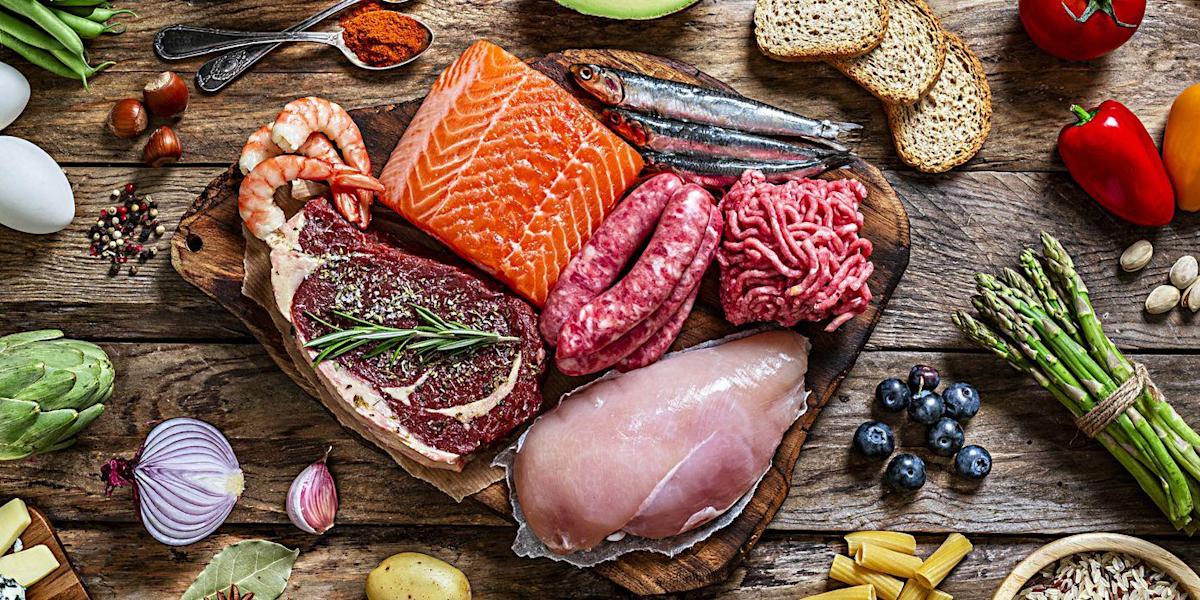
- New research found eating protein from a variety of sources was associated with a lower risk of developing high blood pressure.
- Participants who ate four or more protein sources a week had a 66% lower risk of developing hypertension compared to those who had two or fewer protein sources a week.
- Experts recommend eating a well-balanced diet, exercising, and getting enough sleep to keep blood pressure in check.
What you eat can have a major impact on your overall health. Especially when it comes to heart health, you’ll often hear medical professionals touting diets (like the Mediterranean diet) that increase vegetables, heart-healthy fats, and whole grains, while slashing animal products and sodium. But a new study looked at a lesser talked about nutrient’s ability to impact our heart health—protein.
The research published in the journal Hypertension suggests eating a diet with a greater variety of protein sources may help adults lower their risk of developing high blood pressure. Researchers examined data from nearly 12,200 participants from the China Health and Nutrition Survey who were part of at least two of the seven rounds of the questionnaire. Participants self-reported their diets for three consecutive days and they reported what types of food they kept in their homes. Researchers used the initial responses as a baseline and the final round of questionnaires as a follow-up.
Participants were scored based on how many protein sources were consumed of eight categories. These protein sources included whole grains, refined grains, processed red meat, unprocessed red meat, poultry, fish, eggs, and legumes. For each source eaten, participants were given one point.
After an average of six years, researchers followed up with participants to gauge if they had developed new-onset hypertension since the original survey. New-onset hypertension was defined as a systolic pressure above or equal to 140 mm Hg and diastolic blood pressure greater than or equal to 90 mm Hg, or if a medical professional diagnosed or began treating a participant with high blood pressure, according to the study.
Researchers found that more than 35% of the participants developed early-onset hypertension during the follow-ups. Those who ate four or more protein sources a week had a 66% lower risk of developing high blood pressure compared to those who had two or fewer protein sources a week.
“Nutrition may be an easily accessible and effective measure to fight against hypertension. Along with fat and carbohydrates, protein is one of the three basic macronutrients,” study author Xianhui Qin, M.D., of the National Clinical Research Center for Kidney Disease at Nanfang Hospital at Southern Medical University in Guangzhou, China, said in the press release.
Is there a correlation between protein and blood pressure?
But what is it about protein specifically that may help keep blood pressure in check? Up until this point Alice H. Lichtenstein, D. Sc., professor of nutrition science and policy and director and senior scientist of the cardiovascular nutrition laboratory at Tufts University says she had never heard of any connections between protein and high blood pressure, but the study’s findings are interesting.
“The heart health message is that consuming a balanced diet with proteins from various different sources, rather than focusing on a single source of dietary protein, may help to prevent the development of high blood pressure,” Dr. Qin said in the press release.
And though the research points to the macronutrient, there are many other nutrients within those foods that could also be contributing, explains Keri Gans, M.S., R.D.N., C.D.N., nutrition consultant and author of The Small Change Diet. For example, legumes also contain fiber and fish contains omega-3 fatty acids which may both impact blood pressure levels, she says.
Gans adds that other sources of protein, like dairy products, nuts, and seeds, provide a good amount of protein as well, but were not included in this study. Lichtenstein hypothesizes this may be because the sample size used has a different diet than many Western cultures.
What is known to cause high blood pressure?
Common causes of high blood pressure include eating too many processed foods and high alcohol consumption. Blood pressure may also be impacted by your family history or other medications you’re taking.
Other than blood pressure medications, there are ways to lower blood pressure naturally by making adjustments to your lifestyle. Managing stress, sleeping between seven to nine hours a night, and adding 150 minutes of physical activity to your week can help ward off high blood pressure, Gans says.
Lichtenstein recommends keeping your daily sodium intake to 2,300 milligrams and avoiding excessive alcohol intake. Additionally, eating foods to lower high blood pressure, like leafy greens and avocados, or following a heart-healthy, low-sodium diet, like the DASH Diet, that’s rich in potassium, calcium, and magnesium, can be beneficial, Gans adds.
The bottom line
High blood pressure is a major concern for nearly half the United States population. Hypertension is one of the leading contributors to cardiovascular disease, and when left untreated can damage the circulatory system and heart health, leading to a heart attack, stroke, and other health conditions, according to the press release. Recent research has even found Americans’ blood pressure has been on the rise and was significantly higher during the COVID-19 pandemic than pre-pandemic.
To improve heart health, Lichtenstein says your day-to-day eating shouldn’t necessarily change just because of this one study. “Guidance or policy is never established on the basis of a single study,” she says. “This report is interesting, but it is important that the findings be replicated prior to making recommendations about protein variety to reduce the risk of developing hypertension.”
While we wait for additional research, currently the American Heart Association (AHA) suggests in their updated dietary guidelines to eat healthy sources of protein, including plant-based sources with some seafood, low-fat or fat-free dairy products, and lean and unprocessed forms of meat or poultry. They recommend eating one to two servings, about 5.5 ounces, of protein daily.









